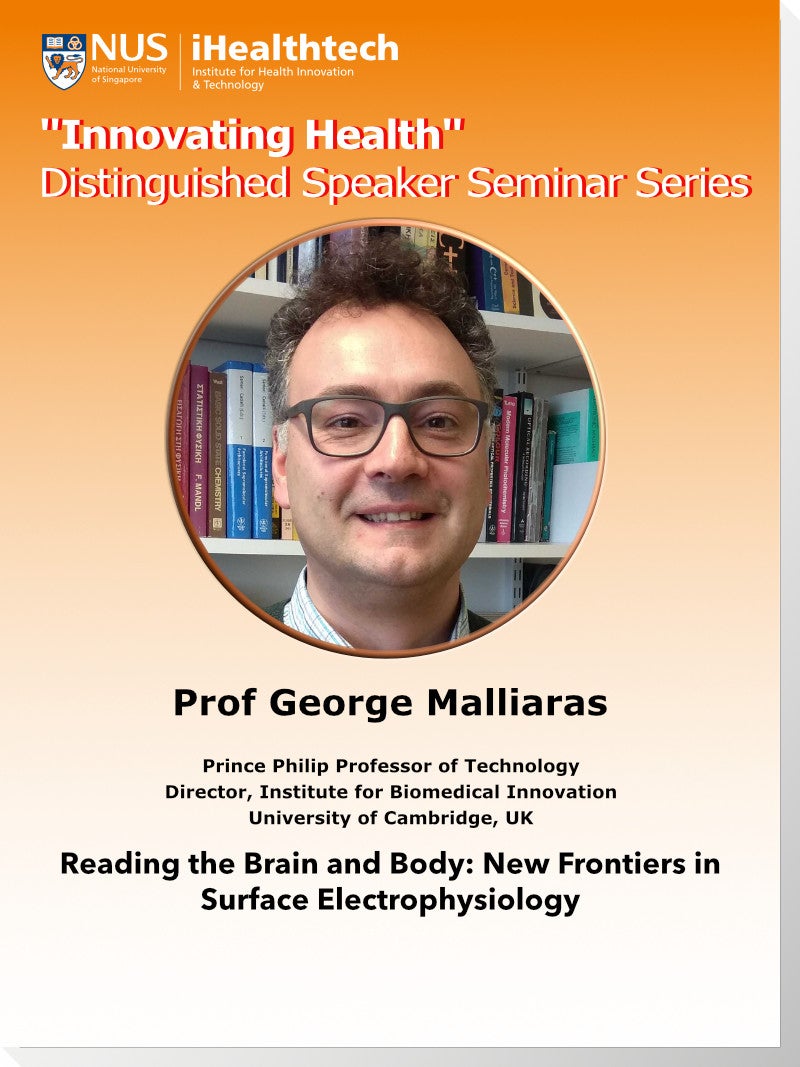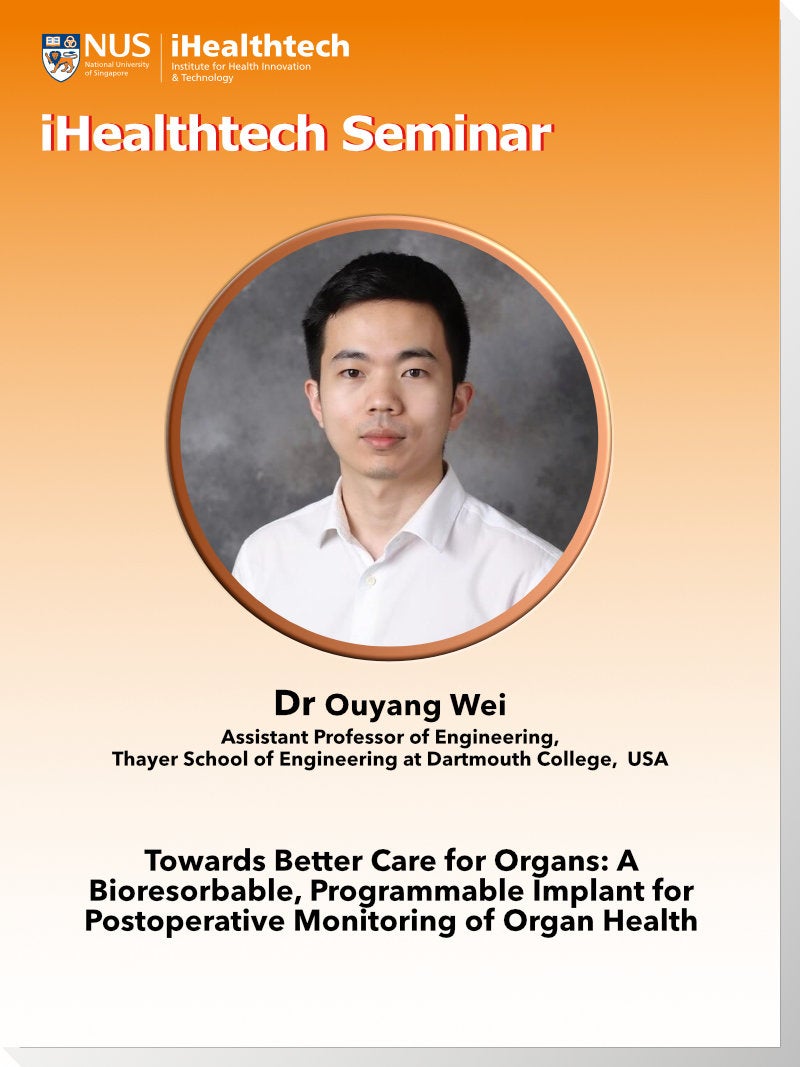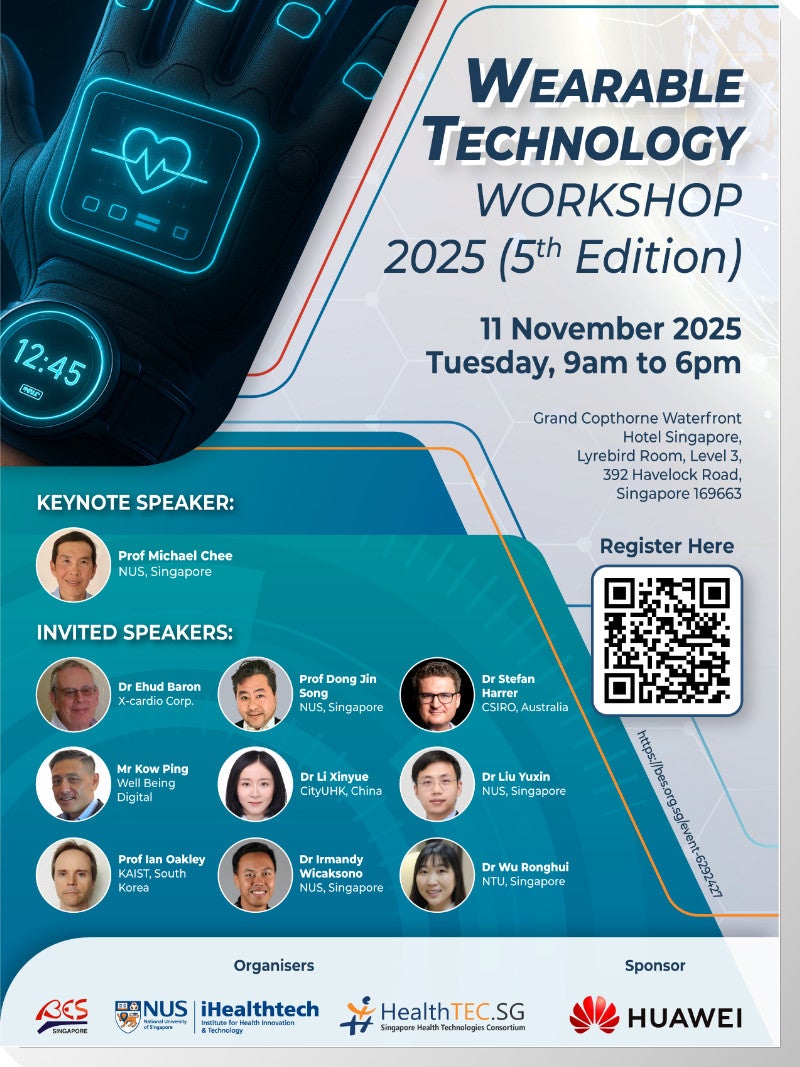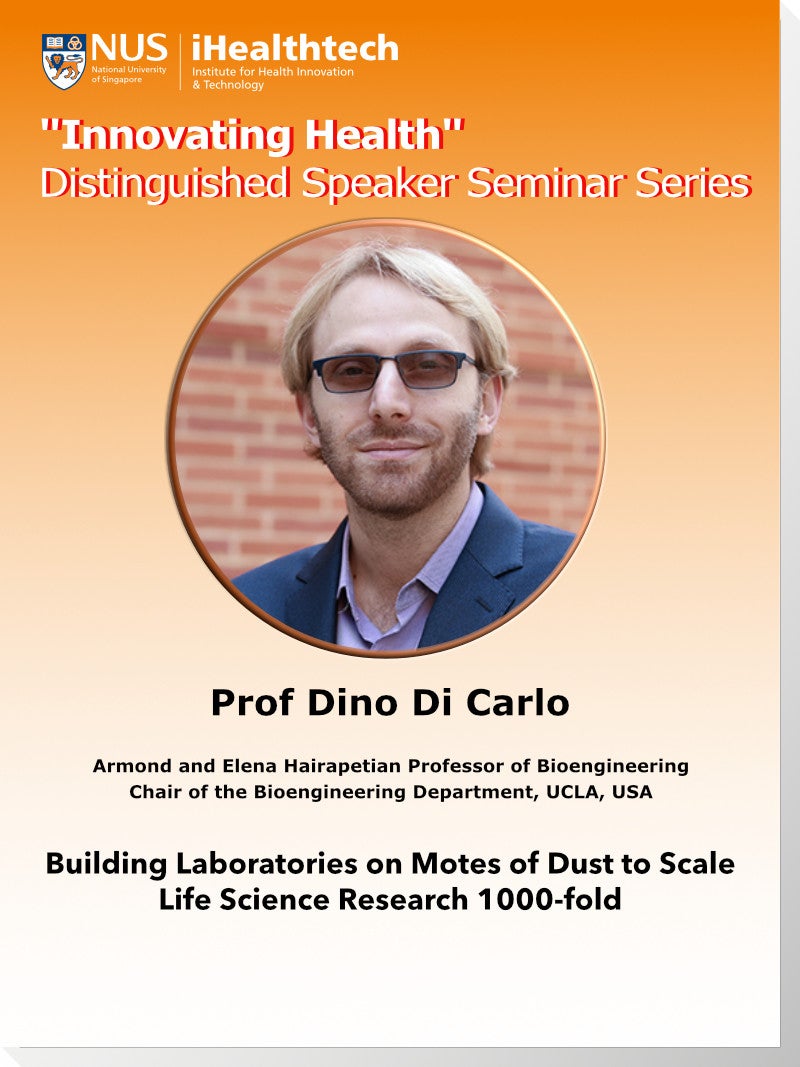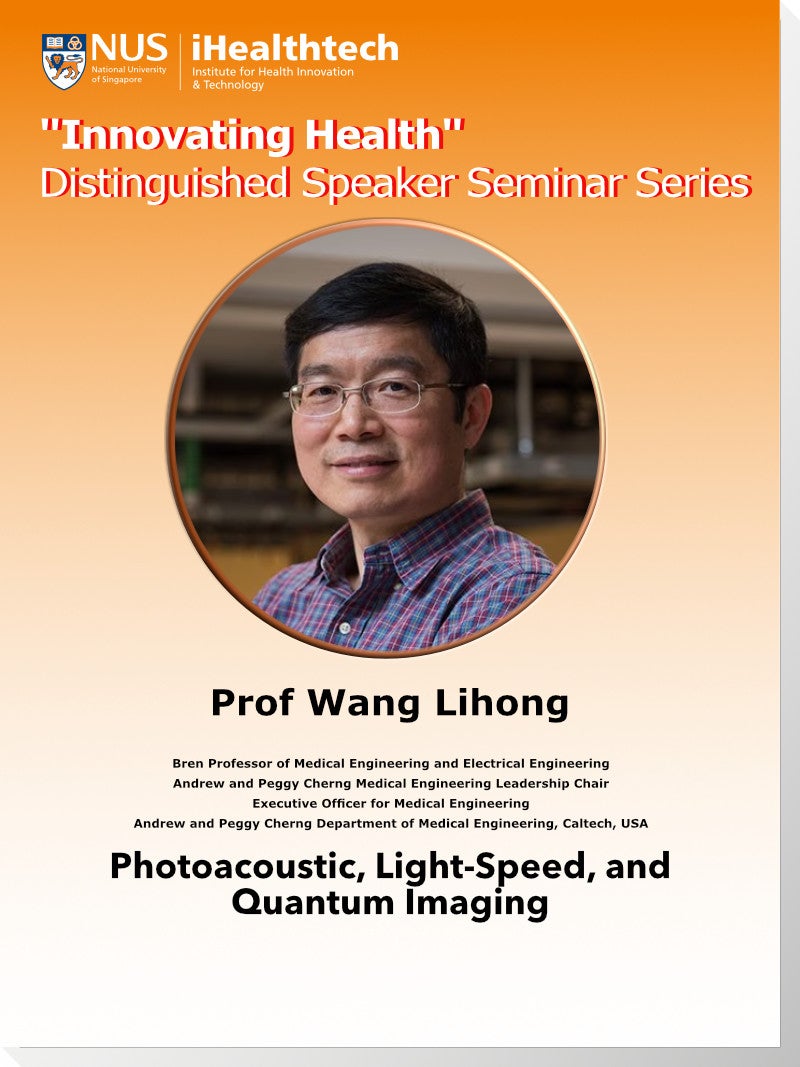4th Health Technology Symposium 2022
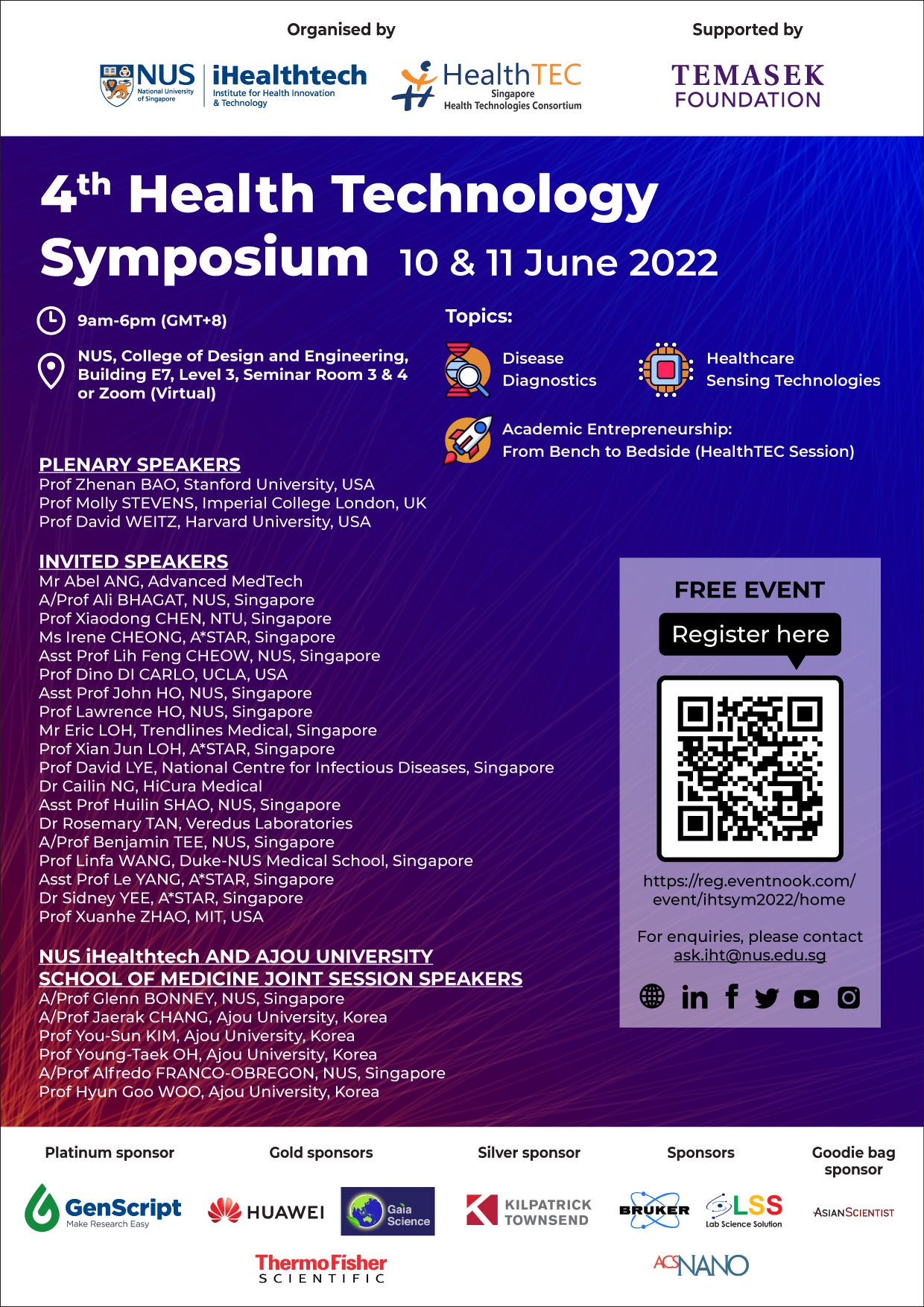
4𝐭𝐡 𝐇𝐞𝐚𝐥𝐭𝐡 𝐓𝐞𝐜𝐡𝐧𝐨𝐥𝐨𝐠𝐲 𝐒𝐲𝐦𝐩𝐨𝐬𝐢𝐮𝐦 2022
🗓10 & 11 June 2022
Health Technology Symposium 2022 is the fourth annual symposium of the Institute for Health Innovation & Technology (iHealthtech). The symposium is co-organised with Singapore Health Technologies Consortium (HealthTEC) and supported by Temasek Foundation to bring together scientists, engineers, clinicians and industry professionals to share their health technology innovations in Disease Diagnostics, AI & Healthcare Sensing Technologies and Academic Entrepreneurship: From Bench to Bedside.
Symposium Poster [PDF]
Programme Booklet [PDF, 3MB]
Sponsorship Opportunities [PDF, 8MB]
Symposium Activity Photos on Facebook [Day 1, Day 2]
PAGE CONTENT
PLENARY SPEAKERS
Prof Zhenan BAO, Stanford University, USA
Prof Molly STEVENS, Imperial College London, UK
Prof David WEITZ, Harvard University, USA
INVITED SPEAKERS
Mr Abel ANG, Advanced MedTech
A/Prof Ali BHAGAT, NUS, Singapore
Prof Xiaodong CHEN, NTU, Singapore
Ms Irene CHEONG, A*STAR, Singapore
Asst Prof Lih Feng CHEOW, NUS, Singapore
Prof Dino DI CARLO, UCLA, USA
Asst Prof John HO, NUS, Singapore
Prof Lawrence HO, NUS, Singapore
Mr Eric LOH, Trendlines Medical, Singapore
Prof Xian Jun LOH, A*STAR, Singapore
Dr Wai Chiong LOKE, MOHT, Singapore
A/Prof David LYE, National Centre for Infectious Diseases, Singapore
Dr Cailin NG, HiCura Medical
Asst Prof Huilin SHAO, NUS, Singapore
Dr Rosemary TAN, Veredus Laboratories
A/Prof Benjamin TEE, NUS, Singapore
Prof Linfa WANG, Duke-NUS Medical School, Singapore
Asst Prof Le YANG, A*STAR, Singapore
Dr Sidney YEE, A*STAR, Singapore
Prof Xuanhe ZHAO, MIT, USA
NUS iHealthtech AND AJOU UNIVERSITY SCHOOL OF MEDICINE JOINT SESSION SPEAKERS
A/Prof Glenn BONNEY, NUS, Singapore
A/Prof Jaerak CHANG, Ajou University, Korea
Prof You-Sun KIM, Ajou University, Korea
Prof Young-Taek OH, Ajou University, Korea
A/Prof Alfredo FRANCO-OBREGON, NUS, Singapore
Prof Hyun Goo WOO, Ajou University, Korea
|
Day 1 (Morning) |
|
|
Opening Ceremony |
|
|
9:00 am – 9:05 am |
Opening Address |
|
9:05 am – 9:15 am |
Introduction to iHealthtech |
|
Plenary Talk 1 |
|
|
9:15 am – 10:00 am |
Droplet Microfluidics for Ultra-High-Throughput Screening and Super-Sensitive Detection |
|
10:00 am – 10:15 am |
Coffee Break |
|
Session 1: Disease Diagnostics |
|
|
10:15 am – 10:45 am |
Antibody Testing in Combating COVID-19 and Future Pandemics |
|
10:45 am – 11:15 am |
COVID-19 Pandemic Research Driven by Clinical and Policy Questions |
|
11:15 am – 11:45 am |
Anatomy of Diagnostics |
|
11:45 am – 12:00 pm |
Integrated Nanosensor Technologies for Molecular Analyses of Circulating Biomarkers |
|
12:00 pm – 12:15 pm |
SAMBA: A Multicolor Digital Melting PCR Platform for Rapid Microbiome Profiling |
|
12:15 pm – 1:15 pm |
Lunch Break |
|
Day 1 (Afternoon) |
|
|
Session 2: NUS iHealthtech and Ajou University School of Medicine Joint Session |
|
|
1:15 pm – 1:20 pm |
Welcome Address |
|
1:20 pm –1:25 pm |
Opening Address |
|
1:25 pm – 1:45 pm |
MOU Signing and Photo Session |
|
1:45 pm – 2:05 pm |
Continues Molecular Spectrum of Liver Cancer |
|
2:05 pm – 2:25 pm |
Precision Therapy in the Supreme Emperor of All Maladies |
|
2:25 pm – 2:45 pm |
Necroptosis in Pathophysiology of Disease |
|
2:45 pm – 3:00 pm |
Coffee Break |
|
3:00 pm – 03:20 pm |
Magnetic Mitohormesis: A Potential Paradigm Shift in Modern Clinical Medicine |
|
3:20 pm – 3:40 pm |
Autophagic Clearance of Protein Aggregates Associated with Neurodegenerative Diseases |
|
Plenary Talk 2 |
|
|
3:40 pm – 4:25 pm 8:40am – 9:25am, Friday, 10 June, London, UK (VIRTUAL LIVE TALK) |
Designing Materials for Therapeutics and Ultrasensitive Biosensing |
|
7:00 pm – 9:00 pm |
Speakers’ Appreciation Dinner (by invitation only) |
|
End of Day 1 |
|
|
Day 2 (Morning) |
|
|
Plenary Talk 3 |
|
|
9:00 am – 09:45 am 6:00pm – 6:45pm, Friday, 10 June, California, USA (VIRTUAL LIVE TALK) |
Skin-Inspired Organic Electronics |
|
Session 3: Healthcare Sensing Technologies |
|
|
9:45 am – 10:15 am |
Artificial Sense Technology |
|
10:15 am – 10:45 am |
PROFESS: Printed, Organic, Flexible Electronics & Sensors |
|
10:45 am – 11:00 am |
Coffee Break |
|
11:00 am – 11:30 am |
Thermogels for Biomedical Applications |
|
11:30 am – 11:45 am |
AI Skins for Health? |
|
11:45 am – 12:00 pm |
Wireless Sensing and Therapy, Anytime and Anywhere |
|
12:00 pm – 1:00 pm |
Lunch Break |
|
Day 2 (Afternoon) |
|
|
Academic Entrepreneurship: From Bench to Bedside (HealthTEC Session) |
|
|
1:00 pm – 1:30 pm |
Scaling Biological Research and Discovery 1000-fold with Lab on a Particle Technology |
|
1:30 pm – 2:00 pm |
Can We Leverage on Innovation to Change Practice, and Improve Lives? |
|
2:00 pm – 2:30 pm |
Soft Medical Robots: Fundamentals and Clinical Translations |
|
2:30 pm – 3:00 pm |
The uSINE Journey: From Concept to Reality |
|
3:00 pm – 3:15 pm |
Coffee Break |
|
Industry and Technology Commercialisation Panel Session |
|
|
3:15 pm – 3:20 pm |
Introduction |
|
3:20 pm – 3:30 pm |
Mr Eric LOH, Trendlines Medical |
|
3:30 pm – 3:40 pm |
Dr Rosemary TAN, Veredus Laboratories |
|
3:40 pm – 3:50 pm |
Mr Abel ANG, Advanced MedTech |
|
3:50 pm – 4:00 pm |
Ms Irene CHEONG, A*STAR, Singapore |
|
4:00 pm – 4:45 pm |
Panel Discussion |
|
Closing Ceremony |
|
|
4:45 pm – 5:00 pm |
Closing Remarks |
|
|
|
|
Lab Tour |
|
|
5:00 pm – 6:00 pm |
Lab Tour of the New Engineering in Medicine Building E7 |
|
End of Symposium |
|
Opening Ceremony
|
Opening Address Professor Chwee Teck LIM |
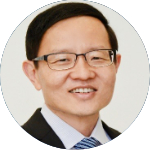 |
|
Biography Professor Chwee Teck LIM is the NUS Society Chair Professor of Biomedical Engineering and Director of the Institute for Health Innovation and Technology (iHealthtech) at the National University of Singapore. His research interest is in the development of innovative microfluidic and wearable technologies for biomedical applications. He is a prolific researcher having co-authored over 450 journal publications including in Nature and Science and given more than 420 plenary/keynote/invited lectures. He is also a serial entrepreneur having started six companies to commercialise technologies developed in his lab. Prof Lim is globally recognised for his distinguished academic achievements as is evidenced by his elected fellowship at the US National Academy of Inventors, the American Institute for Medical & Biological Engineering, the International Academy for Medical & Biological Engineering, the ASEAN Academy of Engineering and Technology, the Academy of Engineering, Singapore and the Singapore National Academy of Science. He and his team have garnered over 100 research awards and honours including Highly Cited Researcher, IES Prestigious Engineering Achievement Award, ASEAN Outstanding Engineering Achievement Award, Asian Scientists 100, Credit Suisse Technopreneur of the Year Award, Wall Street Journal Asian Innovation Award (Gold) and the President’s Technology Award among others. |
|
|
Introduction to iHealthtech Associate Professor Ali Asgar BHAGAT |
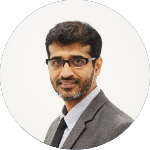 |
|
Biography Ali Asgar Bhagat is the Deputy Director (Translation) at the Institute for Health Innovation and Technology (iHealthtech) and Associate Professor (Practice) in the Department of Biomedical Engineering at National University of Singapore. He leads the translation arm of iHealthtech, Healthtech Translation Hub (HATCH), overseeing intellectual property filing, technology development and commercialization, and developing strategic programs to promote the Institute’s mission. Before NUS, Ali was Principal Manager at Accelerate Technologies Pte Ltd, the commercialization arm of Agency for Science, Technology and Research (A*STAR), in-charge of evaluation and commercialization of biomedical (life sciences and medical device) research output of multiple institutes (>100 patent families). He was also the Chief Operating Officer (COO) of Clearbridge Biomedics Pte Ltd (now Biolidics Ltd), a NUS spin- off developing novel oncology diagnostic solutions. At Clearbridge, he lead the Research and Innovation department overseeing the development of ClearCell® line of products from concept to commercial launch. Before joining Clearbridge, Ali worked as Research Scientist in Biosystems and Micromechanics (BioSyM) group at the Singapore-MIT Alliance for Research and Technology (SMART) Centre, Singapore. Ali received his MS (2006) and PhD (2009) in Electrical Engineering from the University of Cincinnati, USA and held Associate Scientist position at Massachusetts Institute of Technology (MIT), USA. |
|
Plenary Talk 1
|
Professor David WEITZ |
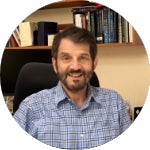 |
|
Droplet Microfluidics for Ultra-High-Throughput Screening and Super-Sensitive Detection This talk will describe the use of drop-based microfluidics for very sensitive detection of biomarkers or cells for diagnostics and pathogen detection. The use of large numbers of tiny drops improves the sensitivity and specificity of the detection. This technology is of particular use in these times of pandemic. I will also show how the small drops can be used for very high throughput screening applications, which is also of great value in detecting cell variability for oncology applications and pathogens studies.
Biography Weitz received his PhD in physics from Harvard University and then joined Exxon Research and Engineering Company, where he worked for nearly 18 years. He then became a professor of physics at the University of Pennsylvania and moved to Harvard at the end of the last millennium as a professor of physics and applied physics. He leads a group studying soft matter science, focusing on materials science, biophysics, microfluidics and flow in porous media. Several startup companies have come from his lab to commercialize research concepts. |
|
Session 1: Disease Diagnostics
|
Professor Linfa WANG |
 |
|
Antibody Testing in Combating COVID-19 and Future Pandemics Upon virus infection or immunization, our body produced a large number of antibodies in our circulation system which play a key role in fighting future infection and preventing clinical diseases. Among the different antibodies produced, there is a small proportion which are able to functionally block or neutralize the virus, hence termed neutralizing antibodies (NAbs). Traditionally, one can only determine NAbs using live virus and cells in an assay termed virus neutralization test (VNT), which requires a high containment facility. For SARS-CoV-2, that requires Biosafety Level 3 (BSL3) labs. In response to COVID-19, we developed a surrogate virus neutralization test (sVNT), which is a biochemic mimic of the live virus VNT and can be conducted in most research or clinical labs. This sVNT platform also enabled us to transform it into a multiplex format which can determine NAbs against different viruses (such as the variants of concerns, VOCs, of SARS-CoV-2). In this presentation, I will summarize our current progress in developing and applying the sVNT platform in all aspects of COVID-19 responses, from virus origin, virus evolution to vaccine efficacy and booster vaccines for VOCs.
Biography Linfa Wang is a professor of the Programme in Emerging Infectious Diseases at Duke- NUS Medical School, Singapore, and the executive director of PREPARE, Ministry of Health, Singapore. He is an international leader in the field of emerging zoonotic viruses and virus- host interaction. His current research focuses on why bats are such an important reservoir for emerging viruses and on how we can learn from bats to make us more resilience to infection and diseases in general. He is a member of the WHO SARS Scientific Research Advisory Committee and played a key role in identification of bats as the natural host of SARS-like viruses. In response to the COVID-19 pandemic, he has served/is serving on multiple WHO committees for COVID-19, including the WHO IHR Emergency Committee. Prof Wang has more than 500 scientific publications, including papers in Science, Nature, NEJM and Lancet. He is currently the Editor-in-Chief for the Virology Journal. Prof Wang was elected to the Australian Academy of Technological Sciences and Engineering in 2019 and the American Academy of Microbiology in 2021. He received the Singapore President Science Award in 2021. |
|
|
Professor David LYE |
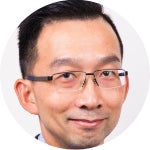 |
|
COVID-19 Pandemic Research Driven by Clinical and Policy Questions Since the arrival of COVID-19 in Singapore in January 2020, a national COVID-19 research workgroup was set up at National Centre for Infectious Diseases involving multiple partners including Ministry of Health, National Medical Research Council, ASTAR, academic institutions and public hospitals. Research priorities were identified and studies undertaken to address them. Central to this pandemic research effort is a prospective COVID-19 cohort study called PROTECT. Studies focused on clinical severity, predictors of severity, transmission, immunopathogenesis, diagnostics and clinical trials of treatment. I will share salient published work from the early days to Delta and Omicron variants.
Biography Professor Lye is Director, Infectious Disease Research and Training Office, National Centre for Infectious Disease (NCID); professor, Lee Kong Chian School of Medicine; and acting deputy executive director, Programme for Research in Epidemic Preparedness and Response (PREPARE), Ministry of Health, Singapore. He is a senior consultant at the Department of Infectious Diseases, TTSH and an associate professor at Yong Loo Lin School of Medicine. As principal investigator, Professor Lye has held more than SGD$12 million in research grants. His research interests are COVID-19, dengue and antimicrobial resistance. He has published more than 290 peer-reviewed manuscripts in high-impact journals NEJM, Lancet, JAMA, Lancet Respiratory Medicine, Lancet Infectious Diseases, Lancet Global Health, Science, Nature Biotechnology, Nature Communications, Science Translational Medicine, Journal Clinical Investigation, Journal Experimental Medicine etc. Professor Lye is President, College of Physicians, Singapore, and the Society of Infectious Disease (Singapore). He advocates for HIV prevention as Vice President of Action for AIDS. Internationally, he is secretary-general, Asia Pacific Society of Clinical Microbiology and Infection; ex officio, executive committee, International Society of Antimicrobial Chemotherapy; and council member, International Society of Infectious Diseases. His publications can be viewed at: https://scholar.google.com.sg/citations?user=oddtEk0AAAAJ&hl=en |
|
|
Dr Sidney YEE |
 |
|
Anatomy of Diagnostics Diagnostics is an essential component of quality healthcare which was clearly demonstrated in the strategies for managing different phases of the COVID-19 pandemic. The development of novel diagnostics from bench to practice, known as ‘Productisation’ at DxD Hub, is a deliberate process which closely follows the Total Product Life-Cycle framework. In this talk, Dr Sidney Yee, the founding CEO of DxD Hub, will provide an overview of the end-to-end productisation model and the considerations the organisation had to navigate while developing a novel diagnostics product that was in urgent demand during the initial phase of the fight against the pandemic.
Biography Sidney is the founding CEO of Diagnostics Development (DxD) Hub, a national platform hosted by Singapore’s Agency for Science, Technology and Research (A*STAR). DxD Hub is a design, development and productisation hub for diagnostics solutions, with the expertise and capability to rapidly translate R&D output from public and private sectors, into deployable Medtech products. Sidney is co-chair of the ASEAN Diagnostics Development Initiative and Adjunct Associate Professor at the Centre of Regulatory Excellence (CoRE), Duke-NUS Medical School. Sidney leads the Diagnostics Co-Operative of the Programme for Research in Epidemic Preparedness And Response (PREPARE), Singapore. PREPARE is Singapore’s national platform focusing on strengthening mid-to-long-term R&D capabilities to prevent, prepare for and respond to future epidemics. Prior to joining A*STAR, Sidney co-founded and helped grow a number of startups in the biotech/MedTech space. During her tenure at EDB Investments, Sidney led several investments in early-stage companies in genomics, drug development and medical devices. |
|
|
Assistant Professor Huilin SHAO |
 |
|
Integrated Nanosensor Technologies for Molecular Analyses of Circulating Biomarkers The growing emphasis on personalised medicine significantly increases the need to analyze key molecular markers. In comparison to tissue biopsies, circulating biomarkers (liquid biopsies) can be conveniently and repeatedly obtained from biofluids with minimal complications. Extracellular vesicles have recently emerged as a promising circulating biomarker. Extracellular vesicles are nanometer-sized membrane vesicles actively shed off by cells and possess unique advantages: they abound in biofluids and harbour diverse molecular contents. In this talk, I will describe various nanosensor systems we have developed for quantitative analyses of diverse circulating biomarkers. These technologies integrate advances in device engineering, nanomaterial sciences and molecular biology. By enabling rapid, sensitive and cost-effective detection of circulating biomarkers, these platforms could significantly expand the reach of preclinical and clinical research, in informing therapy selection, rationally directing trials, and improving sequential monitoring to achieve better clinical outcomes.
Biography Dr Huilin Shao is Presidential Young Professor, Department of Biomedical Engineering, and Principal Investigator, Institute for Health Innovation & Technology (iHealthtech), National University of Singapore. Dr Shao received her BA from Cornell University, with a double major in Biological Sciences and Physics. She completed her dual PhD (Biophysics) at Harvard University and PhD (Medical Engineering) from Harvard-MIT Health Sciences and Technology (HST). Her research focuses on developing integrated nanotechnology platforms for molecular analyses of novel biomarkers. She has pioneered multiple technologies to advance molecular diagnostics. Her work has been published in top journals such as Nature Biotechnology, Nature Nanotechnology, Nature Medicine, Nature Biomedical Engineering, Nature Communications and highlighted in major reviews and popular news media. Dr Shao has received multiple awards in recognition of her achievement, including James Mills Pierce Award, A*STAR Independent Fellowship, NUS Early Career Research Award, the L’Oreal For Women in Science National Fellowship, Springer-Nature MINE Young Scientist Award, and Singapore Presidential Young Scientist Award. |
|
|
Assistant Professor Lih Feng CHEOW |
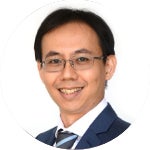 |
|
SAMBA: A Multicolor Digital Melting PCR Platform for Rapid Microbiome Profiling During the past decade, breakthroughs in sequencing technology have provided the basis for studies of the myriad ways in which microbial communities in and on the human body influence human health and disease. In almost every medical specialty, there is now a growing interest in accurate and quantitative profiling of the microbiota for use in diagnostic and therapeutic applications. However, the current next generation sequencing approach for microbiome profiling is costly, requires laborious library preparation, and is challenging to scale up for routine diagnostics. We present Split, Amplify and Melt analysis of BActeria- community (SAMBA), a novel multicolor digital melting PCR in nanoliter chambers with unprecedented multiplexing capability, and demonstrate the capability to distinguish 16 bacteria species and precisely quantify their abundance in mixtures. Subsequently, we applied SAMBA to measure the compositions of bacteria in the gut microbiome to identify microbial dysbiosis related to colorectal cancer. This rapid, low cost and high-throughput approach will enable the implementation of microbiome diagnostics in clinical laboratories and routine medical practice.
Biography Lih Feng Cheow is a Principal Investigator at the Institute of Health Innovation and Technology (iHealthtech) and Assistant Professor in the NUS Department of Biomedical Engineering. He received his B.Sc. (Electrical and Computer Engineering) from Cornell University and PhD (Electrical Engineering and Computer Science) from Massachusetts Institute of Technology. His research interest is in developing technology platforms to perform precision measurements of multiple modalities (e.g. genetic, epigenetic, transcriptomics) in individual cells, and inventing innovative technologies for bio-sample preparation and disease diagnosis to meet the evolving healthcare needs of society. |
|
Session 2: NUS iHealthtech and Ajou University School of Medicine Joint Session
|
Professor Hyun Goo WOO |
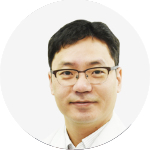 |
|
Continues Molecular Spectrum of Liver Cancer Background and Aims: Primary liver cancers (LCs), including HCC and intrahepatic cholangiocarcinoma (iCCA), are derived from a common developmental lineage, conferring a molecular spectrum between them. To elucidate the molecular spectrum, we performed an integrative analysis of transcriptome profiles associated with patients’ radiopathologic features. Approach and Results: We identified four LC subtypes (LC1–LC4) from RNA- sequencing profiles, revealing intermediate subtypes between HCC and iCCA. LC1 is a typical HCC characterised by active bile acid metabolism, telomerase reverse transcriptase promoter mutations, and high uptake of gadoxetic acid in MRI. LC2 is an iCCA-like HCC characterised by expression of the progenitor cell-like trait, tumour protein p53 mutations, and rim arterial- phase hyperenhancement in MRI. LC3 is an HCC-like iCCA, mainly small duct (SD) type, associated with HCC-related etiologic factors. LC4 is further subclassified into LC4-SD and LC4-large duct iCCAs according to the pathological features, which exhibited distinct genetic variations (e.g., KRAS, isocitrate dehydrogenase 1/2 mutation, and FGF receptor 2 fusion), stromal type, and prognostic outcomes. Conclusions: Our integrated view of the molecular spectrum of LCs can identify subtypes associated with transcriptomic, genomic, and radiopathologic features, providing mechanistic insights into heterogeneous LC progression.
Biography Prof Hyun Goo Woo is an emerging scientific figure in cancer genomics research, currently serving at Ajou University School of Medicine, South Korea. He graduated from Korea University (MD) and Ajou University (PhD). He served as Postdoctoral Fellow at National Cancer Institute, the USA from 2006 to 2010. Then, he joined Ajou University as a Professor. He now serves as a Chair for the Department of Biomedical Science, Ajou University Graduate School. He also serves as a director for Ajou Translational Omics Center (ATOC) and Ajou University Data Center for BioMedicine & PharmacoTherapeutics (AUDC-BMPT). He is interested in integrative genomic data analysis using high-throughput sequencing and array-based genomic data, which can identify key drivers and signalling mechanisms responsible for heterogeneous cancer progression. |
|
|
Associate Professor Glenn Kunnath BONNEY |
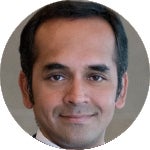 |
|
Precision Therapy for the Supreme Emperor of All Maladies Pancreatic ductal adenocarcinoma (PDCA) is aggressive cancer with a dismal prognosis. Currently, PDAC is treated with either gemcitabine with nab-paclitaxel or FOLFIRINOX, combined with surgery in a minority of patients. Personalised therapy using molecular profiling by genetic sequencing has not improved outcomes for patients with pancreatic cancer due to the relatively low proportion of actionable mutations and limited treatment options. There is an urgent need for biomarkers to predict response to current treatment regimens and select patients who may benefit from other novel therapeutics. Tumour samples from patients undergoing biopsy or surgical resection for pancreatic cancer were used to generate patient-derived organoids. Using a novel combination of growth media and factors would allow expansion for downstream analysis. Targeted sequencing for KRAS was used for confirmation of tumour identity. This study characterises the pancreatic cancer proteome changes in response to drug perturbations in patient-derived organoids. By combining this study with phenotypic drug screening to classify responders and nonresponders, we aim to identify proteomic biomarkers that can predict response to therapy and aid in personalising therapy for pancreatic cancer.
Biography Glenn Kunnath Bonney is a Consultant Hepatobiliary and Liver and Pancreas Transplant Surgeon at the National University Hospital Singapore, Director of Research at the Department of Surgery National University Hospital and the Principal Investigator of the SurgiCAL ProtEomnics Laboratory at NUS iHealthtech. His primary interest is in surgery for primary and secondary malignancies of the liver, pancreas and gallbladder, donor/recipient matching for liver transplantation and extending donor criteria. His group at iHealthtech leads pioneering work in hepatocellular carcinoma and pancreas cancer using next-generation proteomics. His clinical research has resulted in him receiving the Presidential Award of the International Hepatopancreaticobiliary Association (Seoul 2014). His translational research has also been awarded national grants. Bonney received his Doctorate of Medicine (MD) from Cancer Research UK in 2008. He subsequently pursued Higher Surgical Training in Birmingham at the University Hospitals of Birmingham, which is one of the largest liver transplant, liver and pancreas resection units in Europe. |
|
|
Professor You-Sun KIM |
 |
|
Necroptosis in Pathophysiology of Disease Cell death in mammalian cells occurs via multiple mechanisms (e.g., apoptosis, necroptosis, pyroptosis, etc.) in response to different stresses. The abnormal regulation of cell death contributes to various human diseases such as neurodegeneration, autoimmune diseases, infectious diseases, and cancer. Necroptosis is a pathway for genetically programmed lytic cell death that is thought to have a role in killing pathogen-infected cells and/or damaged cells during certain degenerative or inflammatory disorders. Necroptosis is activated by death receptor ligands and pattern recognition receptors of the innate immune system and, from many reports, appears to be highly significant in health and human disease. This is partially due to the fact that necroptosis is distinguished from other modes of cell death, especially apoptosis, in that it is highly proinflammatory given that cell membrane integrity is lost, triggering the activation of the immune system and inflammation. In this talk, I will discuss the roles of Receptor-interacting protein kinase-3 (RIPK3, or RIPK3), an essential protein in necroptosis, in pathological situations in which RIPK3/ necroptosis may play a role.
Biography You-Sun Kim is a Professor at the Department of Biochemistry, Ajou University School of Medicine, Korea. She received her PhD degree from Pusan National University in 2002. She did her postdoctoral training at the National Cancer Institute, National Institutes of Health, USA. She established her academic career at Ajou University School of Medicine, from Assistant Professor, Associate Professor, to Full Professor. Her main research interests are in cell biology, focusing on inflammation, anti-tumoral immunity, and cell death, especially necroptosis. She has published more than 70 research papers, including Nature Immunology, Molecular Cell, Cell Research, and Molecular Cancer as a corresponding author. She serves as the Editor for BMB Reports. |
|
|
Associate Professor Alfredo FRANCO-OBREGON |
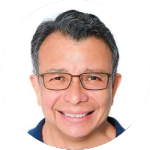 |
|
Magnetic Mitohormesis: A Potential Paradigm Shift in Modern Clinical Medicine Life, as we know it, evolved in an electromagnetic realm. Hence, biochemistry is set to a threshold under weak magnetic fields such as that which naturally envelops the Earth. Our scientific strategy exploits this innate biological imperative to promote tissue regeneration and human health. Today I will outline our initial achievements at the National University of Singapore in this endeavour.
Biography Associate Professor Alfredo Franco-Obregón approaches tissue engineering and regeneration from a biophysical perspective as an alternative to conventional pharmacological interventions. He is particularly interested in how electromagnetic and mechanical forces drive tissue regeneration. Professor Alfredo Franco-Obregón heads the BICEPS (BioIonic Currents Electromagnetic Pulsing Systems) laboratory under the combined auspices of the Department of Surgery and iHealthtech (Institute for Health Innovation & Technology) of the National University of Singapore (NUS). He is actively investigating how magnetic fields promote mitochondrial respiration and downstream developmental and survival adaptations via a process known as Magnetic Mitohormesis. His key areas of interest are skeletal muscle development, stem cell biology, and cancer. He is a thought leader and innovator in applying electromagnetic and mechanical forces for tissue engineering and regenerative medicine and clinical applications concerning human health and longevity. |
|
|
Associate Professor Jaerak CHANG |
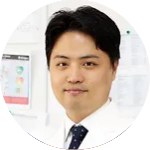 |
|
Autophagic Clearance of Protein Aggregates Associated with Neurodegenerative Diseases Accumulation of various types of abnormal/unwanted intracellular substances is one of the main causes of the development of neurodegenerative diseases including Alzheimer’s disease and Parkinson’s disease. Autophagy is a fundamental intracellular process for clearance of unwanted or damaged materials accumulated in the cell. The autophagic process is initiated by the formation of phagophore mediated by sequential recruitment of specific protein complexes. The phagophore matures into the autophagosome which engulfs autophagic cargos such as cytoplasmic proteins and organelles. Autophagy is finally completed by the degradation of the materials at the autolysosome which is formed by the fusion of the autophagosome and the lysosome. Tripartite motif (TRIM) proteins are a subfamily of the RING- type E3 ubiquitin ligase family and various functional domains of TRIM proteins including the RING domain enable the proteins to play critical roles in a wide range of biological processes. In this presentation, I will discuss the roles of a TRIM protein in autophagic clearance which might be linked to the onset or progression of neurodegenerative diseases.
Biography Dr. Jaerak Chang received his B.S. degree in Biological Sciences at Seoul National University in 2002, and his Ph.D. degree in Biological Sciences from the same institute in 2009. His graduate studies were on the integrity and biogenesis of centrosomes. From 2010 to 2011, he conducted postdoctoral research at National Cancer Institute, National Institutes of Health (NIH). In 2011, he moved to National Institute of Neurological Disorders and Stroke, NIH, and joined the laboratory of Dr. Craig Blackstone where he has studied cellular pathogenesis of hereditary spastic paraplegia at the cellular level. Dr. Chang joined Ajou University in 2016 as an assistant professor, and now he is an associate professor in Department of Brain Science, Ajou University School of Medicine. His current research interests include understanding of the detailed mechanisms of various types of selective autophagy, and investigating their relationships with the pathogenic mechanisms of human disorders including neurodegenerative diseases. |
|
Plenary Talk 2
|
Professor Molly STEVENS |
 |
|
Designing Materials for Therapeutics and Ultrasensitive Biosensing Biography Prof Molly M Stevens FREng FRS is Professor of Biomedical Materials and Regenerative Medicine and the Research Director for Biomedical Material Sciences in the Department of Materials, in the Department of Bioengineering and the Institute of Biomedical Engineering at Imperial College London. Prof Stevens’ research balances the investigation of fundamental science with the development of technology to address major healthcare challenges. Her work has been instrumental in elucidating the bio-material interfaces. She has created a broad portfolio of designer biomaterials for applications in disease diagnostics and regenerative medicine. Her substantial body of work influences research groups around the world with over 30 major awards for the groups research and Clarivate Analytics Highly Cited Researcher in Cross-Field research. Prof Stevens holds numerous leadership positions including Director of the UK Regenerative Medicine Platform “Smart Acellular Materials” Hub and Deputy Director of the EPSRC IRC in Early-Warning Sensing Systems for Infectious Diseases. |
|
Plenary Talk 3
|
Professor Zhenan BAO |
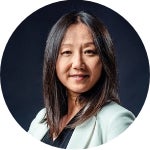 |
|
Skin-Inspired Organic Electronics Skin is the body’s largest organ. It is responsible for the transduction of a vast amount of information. This conformable, stretchable, self-healable and biodegradable material simultaneously collects signals from external stimuli that translate into information such as pressure, pain, and temperature. The development of electronic materials, inspired by the complexity of this organ, is a tremendous, unrealized materials challenge. However, the advent of organic-based electronic materials may offer a potential solution to this longstanding problem. Over the past decade, we have developed materials design concepts to add skin-like functions to organic electronic materials without compromising their electronic properties. These new materials and new devices enabled arrange of new applications in medical devices, robotics and wearable electronics. In this talk, I will discuss basic material design concepts for realizing stretchable, self-healable and biodegradable conductive or semiconductive materials. I will discuss our methods for the scalable fabrication of stretchable electronic circuit blocks. Finally, I will describe a few examples of applications we are pursuing using skin-like organic electronics when interfacing with biological systems, such as low-voltage electrical stimulation, high-resolution large area electrophysiology, and “morphing electronics” that grows with biological system and genetically targeted chemical assembly – GTCA. Biography Prior to joining Stanford in 2004, Zhenan Bao was a Distinguished Member of Technical Staff in Bell Labs and Lucent Technologies from 1995 to 2004. Bao received her PhD in Chemistry from the University of Chicago in 1995. She has over 700 refereed publications and 100 US patents with a Google Scholar H-Index >190. Bao is a member of the National Academy of Engineering, the American Academy of Arts and Sciences and the National Academy of Inventors, a foreign member of the Chinese Academy of Sciences and a Fellow of MRS, ACS, AAAS, SPIE, ACS PMSE and ACS POLY. Bao has won many prestigious awards and honours throughout her career, with some notable and recent ones such as Nature’s Ten people in 2015 as a “Master of Materials” for her work on artificial electronic skin, VinFuture Prize Female Innovator 2022, the ACS Chemistry of Materials Award 2022, etc. She is a co-founder and on the Board of Directors for silicon-valley venture-funded start-ups C3 Nano and PyrAmes. She also serves as an advising Partner for Fusion Venture Capital. |
|
Session 3: Healthcare Sensing Technologies
|
Professor Xiaodong CHEN |
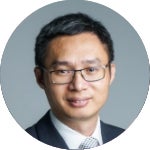 |
|
Artificial Sense Technology Artificial senses refer to the emulation of human’s basic senses and assimilation of them into functional devices and systems to help us understand and perceive the world around us. This research topic of artificial senses is transdisciplinary. It lies at the confluence of materials science, bioengineering, medical sciences, electrical engineering, and computer science. Some use cases, including enhanced sensory capabilities to overcome human physical limitations, improved robotic capabilities and diagnostics with smart information processing, and prosthetics and health-monitoring devices to improve quality of life, are drawing much attention. In this talk, I will present some latest progress in artificial tactile and olfaction from the viewpoint of materials development, sensor fabrication, information processing, and system integration. Artificial senses will enable the construction of next-generation intelligent devices and systems, paving the way for advanced soft robotic applications, rehabilitation, prosthetics, etc.
Biography Professor Xiaodong Chen’s research interests include mechano-materials science, senses digitalisation, flexible electronics technology, and cyber-human interfaces. He has published more than 340 high-profile papers and filed/applied for more than 40 patents. Currently, he is the Editor-in-Chief of ACS Nano and an editorial advisory board member for more than 15 international journals. Professor Chen is an elected Fellow of the Academy of Engineering Singapore and the Royal Society of Chemistry in the UK. In addition, he was recognised with multiple prestigious awards and honours, including Singapore President’s Science Award, Singapore NRF Investigatorship, Small Young Innovator Award, Singapore NRF Fellowship, Nanyang Research Award, Lubrizol Young Materials Science Investigator Award, Mitsui Chemicals-SNIC Industry Award in Materials and Nano-chemistry, and Friedrich Wilhelm Bessel Research Award. |
|
|
Dr Le YANG |
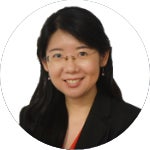 |
|
PROFESS: Printed, Organic, Flexible Electronics & Sensors In this talk, we will introduce the work – past, present and future – undertaken by myself and our group in the organic electronics field – in luminescent materials, optoelectronics and wearable sensors. In particular, we will take a focused foray into our group’s present and future work involving wearable sensors and targeting non-invasive real-time continuous monitoring of sweat and on-skin biomarkers. This includes efforts on sweat electrochemical sensors on metabolites, on-skin wearable sensors, sweat channelling and engineering, sensor electrode engineering, and electrochemiluminescent analytics. These are challenging but invigorating fields that our group has been venturing into for the past two years, contributing to a new era of digital healthcare, cloud-based health data, and wearable personalised devices.
Biography Yang Le received a PhD (Optoelectronics, Physics) from the University of Cambridge. In 2017, she and her colleagues discovered a new emission mechanism in a class of new materials, leading to a breakthrough and record-efficiency organic LEDs useful for next-generation printable display technology. She is now working at the Institute of Materials Research & Engineering (IMRE, A*STAR) on luminescent materials, flexible electronics and smart biosensors, leading the “PROFESS” Group (Printed Organic Flexible Electronics & Sensors). Her notable work has been published in peer-reviewed journals such as Science, Joule, Nature Photonics, Advanced Materials, ACS Energy Letters etc. Le has been actively involved with the local materials research ecosystem, such as the Materials Research Society-Singapore and chairing conferences and outreach events. Le is also a recipient of the Career Development Award, the Central Research Fund, as well as being a Finalist in the Singapore L’OReal-UNESCO For Women in Science Fellowship 2018 and awarded the Singapore 100 Women in Tech Award 2021. |
|
|
Dr Xian Jun LOH |
 |
|
Thermogels for Biomedical Applications Thermogels are soft materials that offer vast scope for customizable tuning of their mechanical properties for various biomedical applications. At low temperatures, they remain as solutions which can be used to entrap therapeutic payloads such as drugs and proteins within their solvated polymer matrices. Upon injection into the body, higher body temperatures cause the solutions to gelate in situ at the injection site, allowing localized placement for applications such as drug delivery. In this talk, I will present a unique platform for biomedical applications, i.e., a three-component thermogelling polyurethane technology comprising biocompatible polyethylene glycol (PEG), poly(propylene glycol) (PPG) with a third component which can be poly(caprolactone) (PCL), poly(tetrahydrofuran) carbonate (PTHF) or poly[(R)-3- hydroxybutyrate-(R)-3-hydroxyhexanoate] (PHBHx). Using mice models, our thermogels loaded with anticancer drugs showed high efficiency in inhibiting tumour growth in vivo. Docetaxel-loaded PEG-PPG-PHBHx thermogels displayed enhanced anti-melanoma effects on solid melanoma tumours compared with the free drug whilst exhibiting excellent biosafety and no apparent harm to organs. With doxorubicin-loaded PEG-PPG-PTHF thermogels, sustained drug release for 16 days in vivo successfully inhibited the growth of hepatocellular carcinoma.
Biography Xian Jun Loh is the Executive Director of the Institute of Materials Research and Engineering (IMRE), A*STAR, and an Adjunct Professor at the National University of Singapore and Nanyang Technological University. He is a pioneer in developing biodegradable thermogels for biomedical, engineering, cosmetics, personal care, and food applications. Loh is also a Fellow of Fitzwilliam College at the University of Cambridge, the Royal Society of Chemistry, IOM3 – The Institute of Materials, Minerals & Mining and the Institution of Engineering and Technology. He is also the current Vice President and member of the Executive Committee of the Singapore National Institute of Chemistry. Loh has published more than 250 journal papers, 38 patents and 7 books. He currently sits on several editorial boards of international journals. Previously, he was also involved in the commercialisation of 8 different products. Xian Jun Loh completed his undergraduate and postgraduate studies at the National University of Singapore. He is a polymer chemist by training. |
|
|
Associate Professor Benjamin TEE |
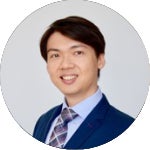 |
|
AI Skins for Health? We live in a hyper-connected environment where humans, smart devices, and robots live in synergy and are rapidly realised within our lifetimes. Skin-like wearable sensors and systems generate greater amounts of data for AI algorithms to understand. Bio- integrable and neuro-integrable sensory systems will augment human abilities and aid in applications such as health diagnostics, surgery and predictive analytics. I will discuss our group’s materials design and strain optimisation techniques to develop electronic materials with stretchability, sensitivity and self-healing properties. We envision that such materials and technologies can be tremendously useful for conformable electronic skins, neuro- prosthetic devices and robots in the increasingly digitally augmented future for the benefit of humankind.
Biography Dr Benjamin C.K. Tee is an Associate Professor in the the Materials Science and Engineering Department at the National University of Singapore. He leads the Sensors.AI Labs to develop technologies at the cutting edge of materials science, mechanics, electronics and biology, focusing on sensitive skin-like electronic materials that have tremendous potential to advance robotics and healthcare technologies in an increasingly Artificial Intelligence (AI) era. |
|
|
Assistant Professor John HO |
 |
|
Wireless Sensing and Therapy, Anytime and Anywhere Connected wireless sensors offer the possibility of monitoring and intervening whenever and wherever health conditions occur. Current sensors, however, are limited in the degree of connectivity that can be achieved around the body and thus their ability to continuously and unobtrusively track a person’s health. In this talk, I will describe recent work by my group to endow health sensors with wireless connectivity and enhance networking performance between multiple sensors. I will highlight an approach to creating wirelessly functional textiles that interact with the user through technologies such as Bluetooth, Wi-Fi, and NFC using the electronic textile toolkit. I will also discuss a class of wound-integrated sensors that can be sutured on deep surgical wounds or worn on surgical dressings to detect complications before they are visibly manifest.
Biography John S. Ho is an assistant professor in the Department of Electrical and Computer Engineering at the National University of Singapore. He received his PhD in electrical engineering at Stanford University, where he developed a wireless power transfer technology that has been translated for clinic use in patients. He is a recipient of the NRF Fellowship and the Young Scientist Award and has appeared on the MIT TR35 Innovator Under 35 Asia and Forbes 30 Under 30 Asia lists. His research focuses on developing medical devices that can wirelessly monitor and intervene wherever and whenever diseases occur in the body. |
|
Academic Entrepreneurship: From Bench to Bedside (HealthTEC Session)
|
Professor Dino DI CARLO |
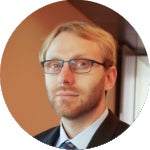 |
|
Scaling Biological Research and Discovery 1000-fold with Lab on a Particle Technology The ability to create picoliter and nanoliter compartments using microfluidics has driven biotechnology at its ultimate “quantum limit” of single cells and molecules. I will discuss the progress we have made in developing assays for cell secretion and growth, leveraging particles to impart new features on compartments, such as enrichment of specific cell types, analysis of adherent cells, and protection of cells to maintain viability during sorting. I will discuss applications selecting antibody-secreting cells to sorting T cells based on TCR binding and secretion of cytokines using standard fluorescence activated cell sorters. Lab on a particle technology promises to expand the capabilities and the accessibility of quantum biological assays laying the groundwork for accelerated discovery of monoclonal antibody and cell therapies. Biography Dino Di Carlo received his B.S. in Bioengineering from the University of California, Berkeley in 2002 and received a Ph.D. in Bioengineering from the University of California, Berkeley and San Francisco in 2006. From 2006-2008 he conducted postdoctoral studies in the Center for Engineering in Medicine at Harvard Medical School. He has been on the faculty in the Department of Bioengineering at UCLA since 2008 and now as Professor of Bioengineering and Mechanical Engineering serves as the Vice Chair of the Department. He is Deputy Director of the National Science Foundation PATHS-UP Engineering Research Center. His research pioneered the use of inertial fluid dynamic effects for the control, separation, and analysis of cells in microfluidic devices. His recent work extends into numerous other fields of biomedicine and biotechnology. He has also been a leader in technology entrepreneurship: He co-founded and currently serves on the board of directors of several companies that are commercializing UCLA intellectual property developed in his lab including CytoVale, Tempo Therapeutics, Forcyte Biotechnologies and Partillion. He also has been an advisor to life science companies including Omega Biosciences (now part of BD) and Cue Health (NASDAQ:HLTH). Among other honors he received the Presidential Early Career Award for Scientists and Engineers (PECASE), the highest honor bestowed by the United States government on young scientists and was elected a Fellow of the American Institute for Medical and Biological Engineering and a Fellow of the Royal Society of Chemistry (FRSC). |
|
|
Professor Lawrence HO |
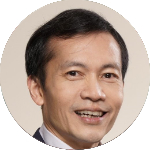 |
|
Can We Leverage on Innovation to Change Practice, and Improve Lives? In this sharing session, I would like to reiterate the values of healthcare innovations to patients, population, and the healthcare systems in terms of better care, more consistent care, and cheaper care. To realize these values, we will need to leverage on entrepreneurship to deploy health innovations at scale. However, despite knowing that adoption of innovations at scale is essential to achieve the aspirational goals of improving and saving lives, we are still struggling to achieve these goals. Case studies will be used to illustrate the challenges of practice changing, including the funding landscape of health innovation, regulatory barriers, and clinical adoption barriers. I will also share my own journey as a clinician innovator, and clinician entrepreneur. I believe leadership alignment, and policy changes will help improve the chances of translating health technology to positive health outcomes.
Biography Lawrence Ho is Professor of Medicine, National University of Singapore; Senior Consultant, National University Hospital; and Director, Centre for Innovation in Healthcare, National University Health System. Besides being an accomplished endoscopist, he is an established international key opinion leader, being conferred the honorary International Life Membership of the Society of Gastrointestinal Endoscopy of India, and made Fellow of Japan Gastroenterological Endoscopy Society, to recognize his significant contributions to the field of endoscopy. Experienced in spearheading collaboration between researchers in Asia, he was the Founding Chairman of the Asian Endoscopic Ultrasound Group, the Gut & Obesity in Asia (“Go Asia”) Workgroup, and the Asian Barrett’s Consortium. |
|
|
Professor Xuanhe ZHAO |
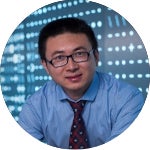 |
|
Soft Medical Robots: Fundamentals and Clinical Translations This talk will use two examples to discuss soft medical robots’ fundamentals and clinical translations. First, we will discuss a magnetically-steerable soft guidewire robot capable of teleoperated and performing robotic neuro-intervention. We will demonstrate the soft guidewire robots’ applications in remotely treating hemorrhagic and ischemic strokes by robotic aneurysm coiling and clot retrieval, respectively. We will validate the safety and efficacy of the soft guidewire robot in both phantom models and live pig models and compare its performances with experienced neuro interventionalists carrying out manual operations. Next, we will discuss a soft neuroprosthetic hand capable of simultaneous myoelectric control and tactile feedback. The soft neuroprosthetic hand is much lighter, cheaper, and softer than existing neuroprosthetic hands. We will validate the soft neuroprosthetic hand on two trans-radial amputees. I will conclude the talk with a vision for the future development and impacts of soft medical robots – aided by and synergized with technologies such as AI, VR, and precision medicine.
Biography Xuanhe Zhao is a Professor of Mechanical Engineering and Civil and Environmental Engineering at MIT. The mission of Zhao Lab is to advance science and technology on the interfaces between humans and machines for addressing grand societal challenges in health and sustainability with integrated expertise in materials, mechanics, and biotechnology. A major focus of Zhao Lab’s current research is the study and development of soft materials and systems. Dr Zhao is the recipient of the NSF CAREER Award, ONR Young Investigator Award, SES Young Investigator Medal, ASME Hughes Young Investigator Award, Adhesion Society’s Young Scientist Award, Materials Today Rising Star Award, and Clarivate Highly Cited Researcher. Six patents from Zhao Lab have been licensed to startup and established companies and contributed to widely used medical devices such as hydrogel-elastomer tissue phantoms. |
|
|
Dr Cailin NG |
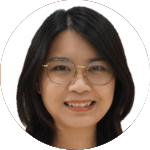 |
|
The uSINE Journey: From Concept to Reality The number of patent filings are increasing every year, but unlike other countries, research institutes are the top contributors of patent filings in Singapore. With the Singapore government investing heavily in the R&D and Innovation, research translation and academic entrepreneurship is a hot topic. In this talk, Dr Ng will be sharing her own experience of bringing a medtech device, uSINE, from product development in the lab to actual implementation in the hospital.
Biography Dr Ng Cailin co-founded HiCura Medical Pte Ltd in 2019 and is their current CEO. She has a background in electrical engineering and spent 10 years in the corporate sector before completing her PhD from NUS. She is passionate about research translation and medical device innovation and commercialisation. |
|
Industry and Technology Commercialisation
Panel Session
Moderator:
|
Mr Andrew T. SERAFINI |
 |
|
Andrew Serafini is a partner at Kilpatrick Townsend & Stockton LLP, a multi-practice international firm with more than 650 attorneys across 21 locations. Dr Serafini is a registered patent lawyer who focuses his practice on strategic and comprehensive intellectual property counselling and management for biotechnology, biopharmaceutical, and other life sciences clients. Dr Serafini is recognised as a top patent practitioner by Chambers USA, IAM Patent 1000, IP Stars, and Legal 500. He also frequently writes and speaks on intellectual property law affecting the life sciences industry. JD Supra recognised Dr Serafini’s article “COVID 19- Related Delays in Filing Patents and Trademark Documents” as among the top five trademark articles for 2020. He was awarded JD Supra’s “Readers’ Choice Award” for Thought Leadership in 2021. Dr Serafini obtained his BS in biochemistry from Case Institute of Technology of Case Western Reserve University, his PhD in immunology from Stanford University School of Medicine, and his JD from the University of California Hastings College of the Law. Learn more at http://www.kilpatricktownsend.com/en/People/S/ SerafiniAndrewT |
|
Panellists:
|
Mr Abel ANG |
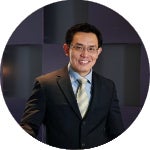 |
|
Mr Abel Ang is the founding Group Chief Executive Officer of Advanced MedTech Holdings, a ~US$300M global player in urology devices and services. The group has quadrupled its revenue since its founding. Mr Ang is an Adjunct Professor at the Nanyang Business School in Singapore and Waseda University in Japan, where he teaches in their respective MBA programs. Mr Ang has a Master of Science in Computational Biology from Rutgers University in New Jersey, which he pursued while on an EDB scholarship. He attended Harvard Business School’s Advanced Management Program in 2012. He was awarded the Public Service Medal (PBM) in 2021 for his contributions to the medical device industry in Singapore. |
|
|
Ms Irene CHEONG |
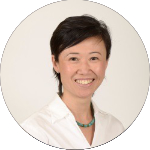 |
|
Ms Irene Cheong leads Human Health & Potential and the Venture Creation & Growth teams at A*Star Enterprise. Her teams work closely with our scientists to enable deep-tech startup formation and win-win partnerships with the industry that result in technology translation and commercialisation. Before joining A*Star, Ms Cheong led the Industry Liaison Office (ILO), the commercialisation and business development arm of the National University of Singapore (NUS). She drove deep tech startup acceleration programmes and industry consortiums as well as managed intellectual property for licencing for NUS and partners. She also has international experience in industry, government and venture capital- having worked locally, in the USA and in Europe. |
|
|
Dr Wai Chiong LOKE |
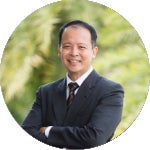 |
|
Wai Chiong leads the MOH Office for Healthcare Transformation (MOHT) Integrated Health Promotion (InHealth) programme to implement a comprehensive set of integrated and coordinated initiatives that aim to make health-promoting behaviours the default. He also helps develop initiatives for mental wellness and financing schemes to support new models of care. Prior to joining MOHT, Wai Chiong was Partner and Healthcare Sector leader for Deloitte Southeast Asia. As a management consultant in the private sector, he advised governments, investors, life sciences companies, providers and payers globally. Wai Chiong completed his medical training at the National University of Singapore. He holds a Master’s in Family Medicine (NUS), Fellowships with the Academy of Medicine Singapore and the College of Family Physicians, and a dual MBA from the University of California (Los Angeles) and the National University of Singapore. |
|
|
Mr Eric LOH |
 |
|
Eric Loh has more than 20 years of experience in the medical device industry. Eric played significant roles in developing Biosensors International, an early-stage cardiovascular device company, to a successful, publicly traded company on the Singapore Stock Exchange. In his role as the Managing Director of Biosensors, he oversaw the establishment of a joint venture operation in China and led successful sales and marketing efforts in several markets in Asia Pacific while managing two manufacturing facilities in Singapore. In 2005, Eric was involved with the company’s IPO on the Singapore Stock Exchange. He continued to lead the corporate development and was involved in several M&A transactions that brought value to the company. After leaving Biosensors, Eric was the CEO of another start-up, EPI Mobile Health, and achieved FDA, CE and HSA approvals of the novel mobile ECG device leading to the commercialization of the products in key markets in Asia. Eric holds an MSc, medical engineering, and BEng (Hons.), both from the National University of Singapore; is a graduate of an Executive MBA with the Helsinki School of Economics; and is a CFA charterholder. |
|
|
Dr Rosemary TAN |
 |
|
Dr Rosemary Tan founded Veredus Laboratories in 2004, a multinational biotech firm specializing in the development, manufacture and commercialization of innovative molecular detection technology for infectious diseases, food safety, biosurveillance and customized applications. Veredus was acquired by Sekisui Chemical, a Japanese conglomerate in one of the largest exits in the local MedTech space in 2018. Dr Tan was awarded the Outstanding Science Alumni Award from the National University of Singapore in 2006. In 2017, she won The Singapore Women’s Weekly Great Women of Our Time Award for Health, Sports and Wellness. She was also honoured as one of the Top Ten innovators and disruptors in The Power List 2017 by The Peak. |
|
We wish to express our gratitude to our corporate sponsors, GenScript (Platinum), Huawei (Gold) and Gaia Science Pte Ltd (Gold), Bruker and Lab Science Solution, for their generous support for this symposium. We thank Asian Scientist Magazine for providing goodie bags for our onsite attendees.
PLATINUM SPONSOR
 |
GOLD SPONSORS
 |
 |
 |
SILVER SPONSOR
 |
SPONSORS
 |
 |
 |
GOODIE BAG SPONSOR


